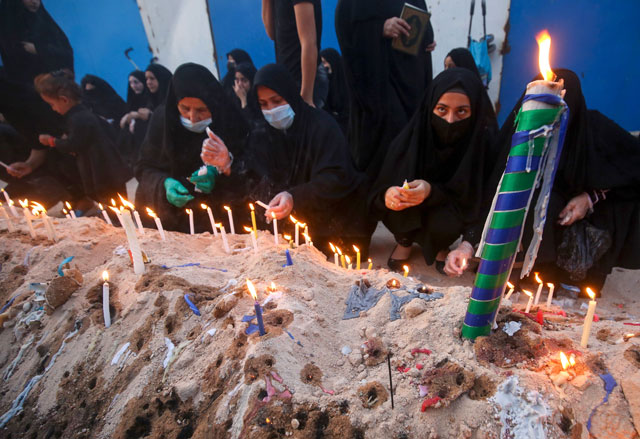KARBALA, Iraq — Tens of thousands of Shiite Muslim pilgrims, some in masks and gloves, flooded Iraq’s Karbala on Sunday to mark Ashura, in one of the largest religious gatherings of the coronavirus era.
Ashura, on the 10th day of the mourning month of Muharram, commemorates the killing of the Prophet Mohammed’s grandson Hussein at the Battle of Karbala in 680 AD.
Typically, millions of Shiites from around the world flock to the holy city’s golden-domed shrine where Hussein’s remains are buried, to pray and cry, shoulder-to-shoulder.
But with coronavirus numbers spiking across the globe, this year’s commemoration has been subdued.
“Honestly, this year is nothing like the millions-strong commemorations of other years,” said Fadel Hakim, who was out early in the streets around the shrine, a blue medical mask cupping his chin.
“It stands out because there are so few people.”
Small clusters of pilgrims gathered in the vast courtyards outside the shrine, wearing the customary black mourning clothes along with less traditional masks and gloves.
To be allowed in, people had their temperatures taken at grey gates resembling metal detectors.
Inside, signs indicated the required distance between worshippers as they pray and nylon sheets prevented people from kissing the walls, a traditional sign of reverence.
Praying for a ‘miracle’
But in the enclave where Imam Hussein is buried, pilgrims pressed their unmasked faces up against the ornate grille separating them from the mausoleum.
Many visitors were crying or sniffling, wiping their faces with bare hands, gestures which could help the virus spread.
Despite directives by Iraq’s health ministry to keep apart, worshippers stood in tight-knit circles to vigorously beat their chests, self-flagellate or make small incisions on their foreheads as signs of grief at Hussein’s death.
They put on a dramatic re-enactment of his killing at the hands of Sunni Caliph Yazid’s forces, then sprinted towards the shrine in the famed “Tuwairij run”.
Some wore masks as they jogged under disinfectant mists, but otherwise no protective measures were taken.
Last year, a stampede broke out in Karbala that left at least 31 dead and dozens more wounded.
“This year will prove to the whole world that a pilgrimage to the Imam Hussein shrine is like a miracle. God willing, there won’t be any new coronavirus cases,” said Mohammad Abdulamir, a mask-less pilgrim.
Karbala Governor Nassif Al Khitabi defended the safety measures put in place and hailed Sunday as a “success”.
“Tens of thousands of pilgrims attended,” he told journalists, or about 65 per cent of the normal volume.
Authorities in Iraq, other Shiite-majority countries and the United Nations urged people to mark Ashura at home.
Neighbouring Iran, which usually sends tens of thousands of pilgrims to Karbala, is the hardest-hit Middle Eastern country with over 21,000 coronavirus deaths.
It broadcast religious rituals on state television and even Iran’s supreme leader, Ayatollah Ali Khamenei, prayed alone, according to images published by his office.
In Sunni-majority Morocco, Ashura is controversially marked as a celebration, not a day of mourning.
Efforts to get worshippers to stay home, however, ended in riots that wounded more than two dozen police officers and led to over 100 arrests.
‘An inferno’
Afghanistan and Pakistan have reported a fall in new virus cases but security remained a top concern, as Ashura has often been tainted by mass violence targeting Shiites.
In the southern port city of Karachi, an estimated 10,000 took part in the largest ceremony, many flagellating their bare backs using multiple blades at once while a heavy security presence kept close watch.
“It’s not possible that anyone would be infected with the virus,” said Israr Hussain Shah, a Shiite devotee in the Pakistani capital Islamabad.
“Rather people come to heal and protect themselves, whether that’s a virus of faith or a sickness,” he said.
In many Shiite-majority countries, authorities have long urged their faithful to donate blood instead of self-flagellating.
This year, Bahrain implemented tougher screening at their blood drive, with health workers meticulously disinfecting the site.
Organisers also swapped their traditional free food distribution with door-to-door delivery instead.
In crisis-hit Lebanon, which has seen a severe coronavirus spike this month, powerful Shiite movements Hizbollah and Amal scrapped large Ashura processions, although a parade was held in the southern town of Nabatiyeh.
Iraq has the second-highest regional toll with close to 7,000 deaths.
That kept Abu Ali home in the packed Baghdad district of Sadr City this Ashura.
“My children, grandchildren and I go to Karbala every year, but this year we were afraid of corona,” he said.
By Salmane Ameen
